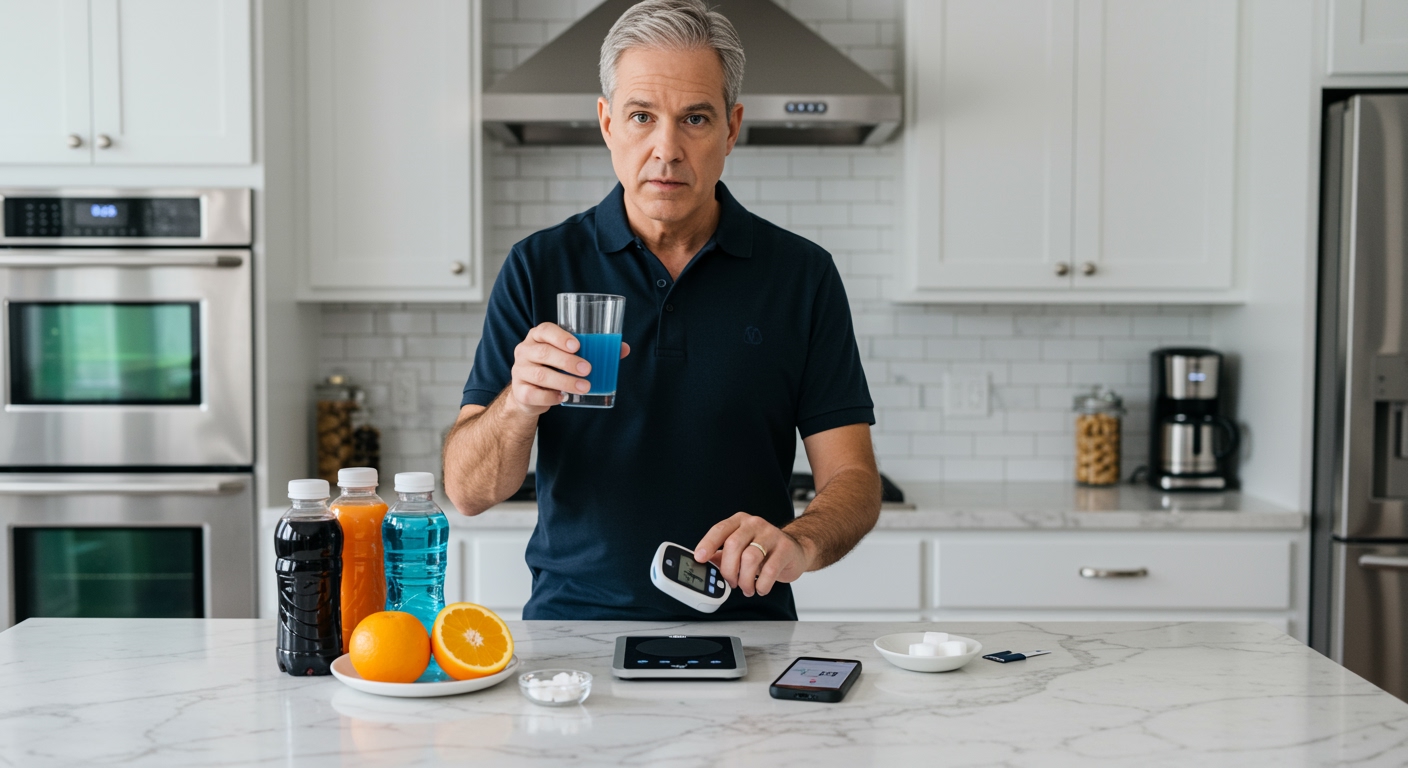✪ Key Takeaway: Sports drinks contain 15-35 grams of sugar per bottle and can dangerously spike blood sugar levels in diabetics.
Introduction
You reach for that bright blue sports drink after your morning walk, thinking it will help replace lost electrolytes and keep you hydrated.
But if you have diabetes, that innocent-looking bottle might be sabotaging your blood sugar control in ways you never imagined.
Hi, I am Abdur, your nutrition coach and today I am going to explain exactly how sports drinks affect your diabetes and what safer alternatives you can choose instead.
What Makes Sports Drinks So Problematic For Diabetics?
Sports drinks were designed for intense athletes who exercise for more than 60 minutes at high intensity levels.
These beverages contain rapid-absorbing sugars like glucose, fructose, and sucrose that quickly enter your bloodstream to fuel working muscles.
A typical 20-ounce sports drink contains between 15 to 35 grams of sugar, which equals about 4 to 9 teaspoons of pure sugar.
When you have diabetes, your body struggles to process this sugar surge effectively because your insulin response is either impaired or completely absent.
The liquid form makes matters worse because liquids empty from your stomach faster than solid foods, causing blood sugar to spike within 15 to 30 minutes of consumption.
Research shows that consuming high-sugar beverages like sports drinks can raise blood glucose levels by 50 to 100 mg/dL or more in people with diabetes.
✪ Fact: One sports drink can contain more sugar than a can of regular soda.
Do You Actually Need Sports Drinks For Exercise?
Most people with diabetes engage in moderate exercise like walking, light jogging, or recreational cycling for 30 to 60 minutes.
For this type of activity, your body has enough stored energy in muscles and liver to fuel your workout without needing external sugar sources.
Sports drinks become necessary only during prolonged intense exercise lasting more than 90 minutes, such as marathon running or competitive cycling.
During shorter workouts, plain water provides all the hydration your body needs to maintain performance and prevent dehydration.
The electrolytes lost through sweat during moderate exercise are minimal and easily replaced through your regular meals throughout the day.
Marketing campaigns have convinced people that sports drinks are essential for any physical activity, but this simply is not true for most recreational exercisers.
✪ Pro Tip: Save sports drinks for workouts longer than 90 minutes at high intensity levels.
What About Sugar-Free Sports Drinks?
Sugar-free sports drinks use artificial sweeteners like sucralose, aspartame, or stevia to provide flavor without raising blood sugar levels.
These beverages contain the same electrolyte profile as regular sports drinks but eliminate the problematic sugar content that spikes glucose.
For people with diabetes who engage in longer exercise sessions, sugar-free versions can provide electrolyte replacement without the blood sugar complications.
However, some individuals experience digestive issues like bloating or diarrhea from certain artificial sweeteners, particularly sugar alcohols.
The key is testing how your body responds to different artificial sweeteners and choosing products that do not cause gastrointestinal distress.
Remember that even sugar-free sports drinks are unnecessary for most exercise routines lasting less than 60 minutes.
✪ Note: Always check labels as some sugar-free drinks still contain small amounts of carbohydrates.
What Are Better Hydration Options For Diabetics?
Plain water remains the gold standard for hydration during most exercise sessions and daily activities.
For enhanced flavor without blood sugar impact, try adding fresh lemon slices, cucumber, or mint leaves to your water bottle.
Coconut water contains natural electrolytes but also has about 6 grams of sugar per cup, so consume it in small portions and monitor blood glucose response.
Homemade electrolyte drinks using a pinch of sea salt, lemon juice, and sugar-free flavoring provide customized hydration without commercial additives.
Herbal teas served cold offer variety and antioxidants while maintaining zero carbohydrate content that keeps blood sugar stable.
For post-workout recovery, consider pairing water with a small portion of protein-rich foods like Greek yogurt or nuts instead of sugary beverages.
✪ Pro Tip: Monitor your urine color to gauge hydration status – pale yellow indicates proper hydration.
When Might Sports Drinks Actually Help Diabetics?
Sports drinks can serve as emergency treatment for severe hypoglycemia when blood sugar drops dangerously low during exercise.
The rapid-absorbing sugars in sports drinks can quickly raise blood glucose levels when you experience symptoms like dizziness, confusion, or shakiness.
Some endurance athletes with diabetes use diluted sports drinks during ultra-long events, mixing one part sports drink with two parts water.
This dilution reduces the sugar concentration while still providing some quick energy and electrolytes during extended physical activity.
Always consult your healthcare provider about using sports drinks as part of your hypoglycemia treatment plan and exercise management strategy.
Keep glucose tablets or gels as your primary hypoglycemia treatment since they provide more precise carbohydrate dosing than sports drinks.
✪ Fact: Fifteen grams of carbohydrates from any source will raise blood sugar by approximately 45 mg/dL.
The Bottom Line
Sports drinks pose significant blood sugar risks for people with diabetes due to their high sugar content and rapid absorption rate.
Smart hydration choices protect your health while supporting your fitness goals, and plain water meets most of your exercise hydration needs perfectly.
I would love to hear about your experiences with sports drinks and diabetes management, so please share your questions or thoughts in the comments below.
References
At NutritionCrown, we use quality and credible sources to ensure our content is accurate and trustworthy. Below are the sources referenced in creating this article:
- North Coast Medical: Sports Drinks and Diabetes What You Need to Know
- American Diabetes Association: Sports Drinks Impact on Glucose Blood Sugar
- Harvard Nutrition Source: Sports Drinks
- PMC: Sports Drinks and Athletic Performance





